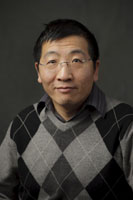A Lehigh professor is facing a statutory maximum of 120 years in prison for a $700,000 scheme to defraud NASA. His sentencing has been set for Sept. 28.

Yujie Ding, Lehigh University professor of electrical and computer engineering (Courtesy of the Lehigh University website)
Yujie Ding, 54, was previously an electrical and computer engineering professor. Ding and his wife, Yulija Zotova, 42, proposed a development project to NASA in 2010. The project was to be carried out by their company, ArkLight, according to The Morning Call. Ding pocketed $300,000 of the grant money while the majority of the work was done by a sole graduate student, identified only as D.L. in court papers.
Ding was arrested by NASA special agent Erik. J. Saracino in 2014 while attempting to flee to Reykjavik, Iceland, wrote Peter Hall, a reporter for The Morning Call. Ding was then freed on $50,000 bail. Zotova was not initially charged, but was identified as the sole owner of ArkLight.
The couple said their research was aimed at creating a “single photon detector,” a device to detect trace levels of chemicals, such as carbon dioxide, in the atmosphere, according to The Morning Call. The project was eventually completed through the work of graduate students in Ding’s lab and delivered to NASA.
In February 2015, the couple was charged with 10 counts of wire fraud in their federal case, according to The Morning Call reporter Frank Warner. If guilty of all counts, the maximum sentence would be 200 years each and a fine of up to $2.5 million.
The indictment focused on the lack of facilities for ArkLight, using the company as a shell to pay themselves without conducting any work for NASA. Phase I of ArkLight’s budget was $100,000 in 2010. Phase II had a budget of $600,000 from 2011 to 2013.
Lehigh University was cleared of any wrongdoing because the couple was determined to conceal information related to the fraud, Warner wrote.
In November 2015, Ding and Zotova’s trial commenced.
The plaintiff said while NASA ultimately got their research project, the pocketed money was a breach in the contract, Hall wrote.
The defendants argued Ding was singled out because of his ethnicity and the work was too difficult for average graduate students to complete on their own, according to The Morning Call. Agent Saracino later said he singled out Ding for being the only contract in NASA’s database under an individual’s name.
As the trial progressed, the focus turned toward Zotova’s role in the NASA project, Hall wrote. Graduate students said she had never appeared in the lab even though her role was to oversee the project. Zotova testified that she had not been involved with ArkLight for over a year, and her lack of supervision over the students was because of a crippling inability to interact with others in person.
After an 11-day trial, the jury found Ding and Zotova guilty of six out of 10 counts of wire fraud for sending fake invoices to NASA from ArkLight, Hall wrote. Each count carries a maximum sentence of 20 years. The juror said there was no scheme to defraud the government originally, but the intent became apparent after a proposal for Phase II of funding was submitted through the ArkLight name.
U.S. District Judge Harvey Bartle set the couple’s sentencing for March 2.
Ding and Zotova argued the jury reached a contradictory verdict, saying there was insufficient evidence showing they intended to commit fraud, Hall wrote. Bartle was quoted as writing, “In our view, there was more than sufficient evidence presented at trial that Ding and Zotova committed the wire fraud alleged in the indictment. The defendants have simply not shown that the convictions have caused a miscarriage of justice.”
The March 2 sentencing was postponed indefinitely while the court discussed their motions.
Sentencing was again postponed in September 2016 because of Ding’s claims of a dispute with his lawyer, Hall wrote. Ding said his defender, Hope Lebefer, refused to discuss aspects of his case. In return, Lebefer showed emails in which she unsuccessfully tried to contact Ding to meet. Lebefer said she is committed to representing Ding without further payment, while Ding said she had requested additional fees.
Bartle told Ding he had too many assets to qualify for a public defender, saying he had the choice of finding another lawyer or continuing with Lebefer, Hall wrote. Either way, Bartle said to be prepared for sentencing Sept. 28.





Comment policy
Comments posted to The Brown and White website are reviewed by a moderator before being approved. Incendiary speech or harassing language, including comments targeted at individuals, may be deemed unacceptable and not published. Spam and other soliciting will also be declined.
The Brown and White also reserves the right to not publish entirely anonymous comments.